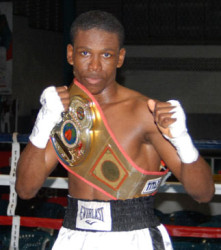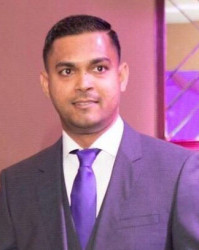Although boxer Clive ‘The Punisher’ Atwell is eager to return to the ring after his recent brain injury, neurosurgeon Dr Amarnauth Dukhi says such injuries make it almost impossible for boxers to continue professional careers.

Atwell, 26, underwent emergency brain surgery on October 24, the night of the ‘Caribbean Knock-down’ card at the Giftland Mall, where his WBC FECARBOX super lightweight fight with Dexter ‘The Cobra’ Gonsalves ended prematurely because of the injury he sustained.
Dukhi, who treated Atwell, said the boxer was rushed to Dr Balwant Singh’s Hospital in an unconscious state and an emergency brain surgery—a decompressive craniectomy—was performed to reduce increased pressure in the brain and stop bleeding. Atwell, after a brief discharge, was subsequently re-admitted to hospital after experiencing brain swelling.
Atwell was diagnosed by Dukhi on the night of the emergency surgery with an acute brain injury that had led to massive intracranial bleeding, and specifically a right subdural hematoma, a post-traumatic subarachnoid haemorrhage and generalised swelling/edema.
This type of injury and specifically the subdural hematoma, according to Dr Dukhi, is consistent with injuries suffered by boxers due to heavy punches to the head.
Dukhi is of the opinion that the injury sustained is due to a left hook to the right side of Atwell’s head during the fight. These types of injuries, he said, makes it almost impossible for boxers to continue their professional boxing careers.
Part of Atwell’s skull was removed during surgery to control swelling and maintain adequate intracranial pressure. As a result, he will require reconstructive surgery, which is usually done after six months and depending on the patient’s neurological recovery.

So far, Atwell has made an excellent recovery since the surgery, but he is being continuously monitored, which is crucial to avoid long-term neurological disorders.
Questioned about his condition since the surgery, Atwell, in a recent interview, told Stabroek News that he has been doing fine and thanked all those who supported him throughout his hospitalisation. He specifically thanked Dukhi, whom he noted performed a life-saving surgery. He said he was aware of the risks if the operation was not done by a certain time. He also thanked Peter Abdool, President of the Guyana Boxing Board of Control for making the right decision after the outcome of the fight.
Atwell said he plans to continue boxing and being a good ambassador for Guyana as long as he can, although he is aware of the risks. He said he taking his recovery one step at a time but is hoping for a speedy return. His mantra is “miracles happen every day.”
“All along I have been keeping the Golden Arrow head flying high and as beautiful as I can,” said Atwell, who began boxing at the age of 13 and turned professional in 2010. His loss to Gonsalves, ruled as a Technical Knockout, brought his record to 13 Wins (7 knockouts), 3 Losses, 1 Draw.
Meanwhile, Abdool, in an invited comment, told Stabroek News recently that the decision for Atwell to enter the boxing ring again is not for the Guyana Boxing Board or any other board in the world, but rather it is a matter of any fighter who desires to enter the ring satisfying the requirement of the doctors. “Any boxer, in any part of the world, with a medical history has to prove to the panel examining him that he can fight again,” Abdool said.
He also said that any known medical history will trigger more questions than necessary from doctors that will determine the ability of the fighter to enter the ring. “… The burden of the boxer is to prove to the doctor that he can fight without [being] an increasing danger to himself,” he pointed out.





